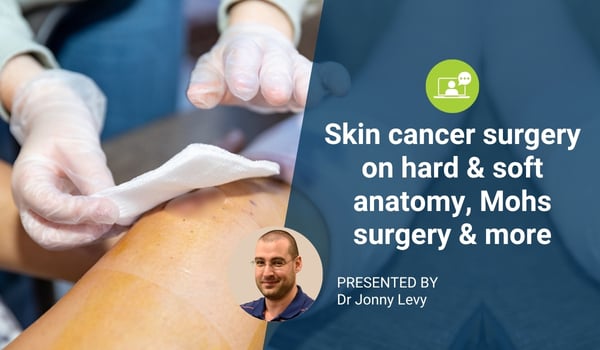Choosing surgical marking pens in skin cancer surgery
Life by a Thousand Cuts podcast series | Learn which surgical marking pens hold up best for precision, safety, and patient outcomes, with A/Prof Tony Dicker.
.jpg)
HealthCert Education
In skin cancer surgery, precision begins before the scalpel touches the skin – it starts with the pen. In this episode of Life by A Thousand Cuts, A/Prof Tony Dicker takes a closer look at surgical marking pens, exploring how the simple act of drawing a line can influence outcomes.
Anyone who has carefully mapped a surgical plan only to see it vanish after prepping the skin, knows the frustration. In this podcast, A/Prof Dicker dives into the evidence behind different pens, from gentian violet markers to permanent markers and even the humble biro, and how antiseptic agents like chlorhexidine, Betadine, and alcohol impact their durability.
He also delves into infection risk, cross-contamination, and the rare but real possibility of ink tattooing if markings are incised. Studies comparing pen performance across skin types and prep solutions offer valuable insights.
A/Prof Dicker also shares his own preferences: permanent markers with a mid-sized tip for clear, reliable lines, applied after cleaning intact skin with alcohol wipes. He stresses the importance of tailoring pen choice to both the surgical setting and patient factors, especially skin tone.
This episode highlights how even a small detail carries big implications for surgical precision, safety, and patient outcomes.
Listen to the podcast
Prefer a visual format? Watch this podcast on the HealthCert Education YouTube channel.
Helpful resources
Read the papers mentioned in this episode:
- Which pen? A comparative study of surgical site markers (Journal of Perioperative Practice) Read >
- Comparing the sterility and visibility of surgical marking pens
available in Australia (ANZJSurg.com) Read >
Life by a Thousand Cuts
This podcast series is designed to help you enhance your clinical decision-making, procedural skills, and confidence in skin cancer management. Focus on real-world cases, surgical techniques and tips, journal article reviews, diagnostic and management insights, and guest interviews with GPs and specialists.
Next steps in your learning journey
🎓 Micro-Courses in Skin Cancer
Explore short, bite-sized CPD modules in focused topics in skin cancer. Complete in less than 10 hours from only $95.
➡️ Browse Micro-Courses >
🎓 Certificate Courses in Skin Cancer
Explore our university-assured, structured pathway to elevate your knowledge in the diagnosis and treatment of skin cancer.
➡️ Explore full program >
🎓 HealthCert 365 subscription
Prefer flexible learning across many topics? Access 4,000+ CPD hours on-demand with HealthCert 365 — anytime, anywhere, one flat annual fee.
➡️ Discover HealthCert 365 >
Or explore more educational content in Skin Cancer.
 About A/Prof Tony Dicker
About A/Prof Tony Dicker
Associate Professor (Skin Cancer) & Course Coordinator MMed (Skin Cancer), The University of Queensland
Tony Dicker has practised full-time Skin Cancer Medicine in Melbourne since 2004, and previously practised in Brisbane. He obtained his PhD from The University of Queensland in molecular biology of skin cancer with Professor Ian Frazer's group at Princess Alexandra Hospital. He then spent three years as a dermatology registrar at the Royal Brisbane and Princess Alexandra Hospitals.
CPD self-submission
You can self-record CPD for this podcast. If you consume educational content on this blog, you can Quick Log CPD hours with the RACGP/ACRRM via the usual self-submission process. You will be asked to reflect on what you have learned, and you will require supporting evidence such as a screenshot. For more information, view the: RACGP CPD guide | ACRRM CPD guide

 1800 867 1390
1800 867 1390.jpg)

.jpg)



